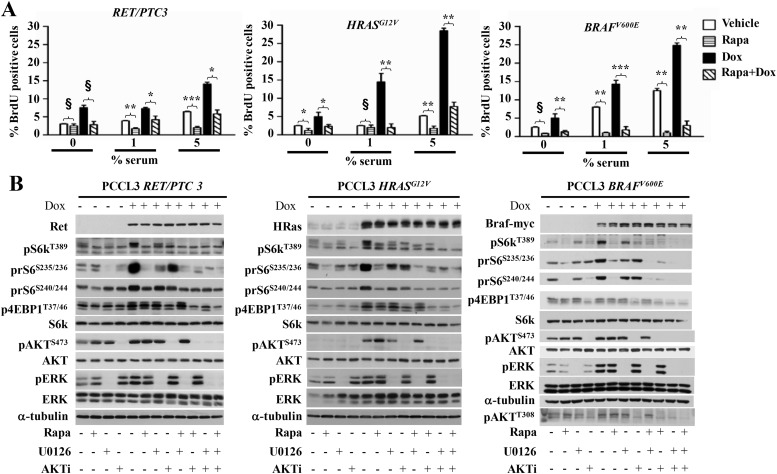Figure 2.
Rapamycin inhibits DNA synthesis induced by RET/PTC3, HRASG12V, or BRAFV600E in rat PCCL3 cells. A, PCCL3 cells modified to express the indicated oncoprotein in a doxycycline-inducible manner were grown in Coon's/H4 + serum and then switched to Coon's/H3 + serum (without TSH) with the indicated serum concentrations for 3 days. Cells were then incubated with 10 μg/mL BrdU for 24 hours with or without 1 μg/mL of doxycycline in the presence or absence of 20 nM rapamycin for 24 hours. BrdU incorporation was analyzed by fluorescence-activated cell sorter. Data represent mean ± SD of six wells. *, P < .05; **, P < .01; ***, P < .001; §, P > .5. B, PCCL3 cells were incubated in Coon's/H3 + serum for 48 hours and then in Coon's − serum for 24 hours. They were then incubated in Coon's − serum with or without 1 μg/mL doxycycline (Dox) for 24 hours. Two hours prior to collection, cells were treated with 20 nM rapamycin, with or without a 30-minute pretreatment with 25 μM U0126 and/or 1 μM AKT1/2 inhibitor (AKTi). Cells were lysed in buffer A and lysates analyzed by Western blotting with the indicated antibodies. Please see Supplemental Table 2 for details on culture media used in these experiments. Densitometry results for the Western blots can be found in Supplemental Figure 5.

